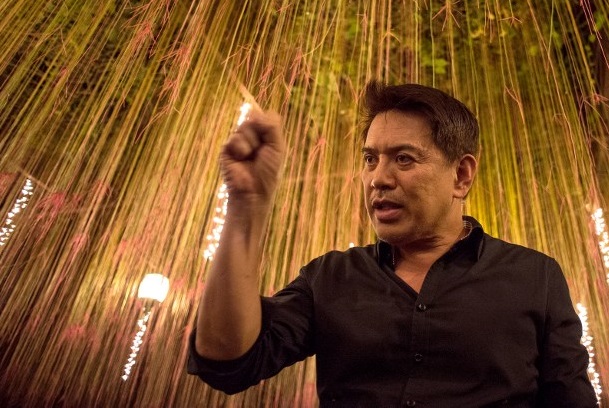
This picture taken on October 17, 2016, shows award-winning director Brillante Mendoza gesturing as he answers questions during an interview in Manila. Mendoza has turned his cinematic skills to promoting someone many in the West would see as an unlikely hero — President Rodrigo Duterte and his deadly drug war. AFP
Award-winning director Brillante Mendoza has turned his cinematic skills to promoting someone many in the West would see as an unlikely hero — President Rodrigo Duterte and his deadly drug war.
Mendoza has become a celebrated figure in the global independent film industry for his gritty movies exposing social injustice and the sufferings of the poor in his home country.
READ: Brillante directs Digong | Brillante Mendoza poverty porn and ignoring affluence
While critics have condemned Duterte’s anti-crime crackdown, which has claimed the lives of thousands of poor people, Mendoza has filmed government advertisements promoting it and directed the broadcast of a presidential address to the nation.
“If there’s one person who understands the situation, it’s the president,” Mendoza, 56, told AFP at his Manila production house that is full of posters of his movies and trophies from top film festivals including Cannes, Venice and Berlin.
“I know there are a lot of people who are not supportive in totality of what he wants and what he’s doing right now, but if you actually have witnessed the real situation, this is the way to go about it.”
“If there’s one person who understands the situation, it’s the president,” Mendoza, 56, told AFP.
Duterte easily won presidential elections in May largely on a campaign pledge to eradicate drugs by killing tens of thousands of people, warning the Philippines was in danger of becoming a narco-state.
Since he took office at the end of June, police have killed more than 1,800 drug suspects and about 2,600 others have died in unexplained circumstances linked to the crackdown, according to official figures.
The president has repeatedly insisted police are only killing in self-defense and that most of the unexplained deaths are due to criminals attacking each other.
But Western governments and human rights organizations have expressed fears about alleged extrajudicial killings and a breakdown in the rule of law.
Those concerns have been fueled by Duterte’s extreme language and comments viewed by critics as incitements to kill.
Culture clash
Duterte said recently he would be “happy to slaughter” three million drug addicts, and likened his campaign to Nazi leader Adolf Hitler’s efforts to exterminate Jews in Europe.
The 71-year-old lawyer later apologized for his Hitler reference, but said he was “emphatic” about wanting to kill drug addicts.
French newspaper Liberation branded Duterte a “serial killer”.
Mendoza, whose films have earned him a French knighthood and a best director award at Cannes, declined to comment on the extrajudicial killings issue.
“You are only seeing it from your perspective as somebody who lives far away from the Philippines. Because you are living in a first-world country.”
He also said he had no personal knowledge of such deaths, while insisting foreign critics misunderstood Duterte due to a culture clash.
“I would tell them you don’t know our president,” Mendoza said.
“You are only seeing it from your perspective as somebody who lives far away from the Philippines. Because you are living in a first-world country.”
For instance, Mendoza said, it was easy for foreigners to misunderstand Duterte’s cursing, which he said was merely “an expression” for people in the southern Philippines where he is from.
Mendoza said he became aware of the full extent of the nation’s drug problem as he researched his film: “Ma’ Rosa”, which won the Cannes best actress award in May and earned a nomination in next year’s Oscars for best foreign language film.
Mendoza said he became aware of the full extent of the nation’s drug problem as he researched his film: “Ma’ Rosa”
“Ma’ Rosa” focuses on a mother selling drugs to make ends meet who is arrested by corrupt policemen.
“I didn’t know there was a huge problem of drugs in this country,” said Mendoza, a former advertising production designer.
The two short films he made pro bono for the government have been viewed millions of times on social media.
In his ultra-realist style, they tell the stories of a father who misses milestones in his daughter’s life due to substance abuse and a Filipina who is working overseas sending money back home to a son hooked on drugs.
Mendoza said he hoped the films, which carry the government’s #partnerforchange hashtag, would help spur drug addicts to kick their habits.
Narrow focus
Mendoza said artists and Asians had a better understanding of Duterte than Europeans, who were only learning about him from the media.
Indeed, tens of millions of Filipinos from all strata of society continue to support Duterte and his efforts to contain the drug menace in the belief it will make society safe.
Many also see him as the strong leader needed to fight enduring problems such as crippling corruption, widespread poverty, a decades-long communist rebellion and Islamic militancy.
Still, not all Filipino artists back Duterte.
“I am not advocating that people who are poor should be put to death. But then, at the end of the day, we shouldn’t only see that in that perspective,” he said.
Actress Agot Isidro caused controversy when she described the president as a “psychopath”.
Prominent filmmaker Pepe Diokno, whose debut film focused on “death squads” allegedly run by Duterte when he was mayor of the southern city of Davao, has been another critic.
Nevertheless, Mendoza insists the drug problem is so complex that it and Duterte cannot just be looked at through the lens of mass killings.
“I am not advocating that people who are poor should be put to death. But then, at the end of the day, we shouldn’t only see that in that perspective,” he said.
“There are a lot of sides we have to consider.” CBB